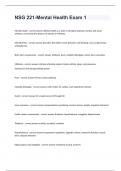NSG 221-Mental Health Exam 1
Mental Health - correct answer defines health as a state of complete physical, mental, and social wellness, not merely the absence of disease or infirmity.
Mental Illness - correct answer disorders that affect mood, behavior, and thinking, such as depression, schizophrenia.
Brain stem components - correct answer midbrain, pons, medulla oblongata, nuclei, locus coeruleus
Midbrain - correct answer reticular activating system (motor activity, sleep, consciousness,
awareness) and extrapyramidal system
Pons - correct answer Primary motor pathway
medulla oblongata - correct answer vital centers for cardiac, and respiratory function
Nuclei - correct answer for cranial nerves III through XII
locus coeruleus - correct answer norepinephrine-producing neurons (stress, anxiety, impulsive behavior)
Limbic system components - correct answer thalamus, hypothalamus, amygdala, hippocampus
Thalamus - correct answer activity, sensation, emotion
Hypothalamus - correct answer temperature regulation, appetite control, endocrine function, sexual drive, impulse behavior
hippocampus and amygdala - correct answer emotional arousal, memory Cerebrum / 2 hemispheres / 4 lobes - correct answer Frontal, parietal, temporal, occipital
Frontal - correct answer thought, body movement, memories, emotions, moral behavior
Parietal Lobe - correct answer taste, touch, spatial orientation
Temporal Lobe - correct answer smell, hearing, memory, emotional expression
Occipital Lobe - correct answer language, visual interpretation such as depth perception
Dopamine - correct answer (excitatory) Controls complex movements, motivation, cognition; regulates emotional response
Dopamine illnesses - correct answer Schizophrenia, Parkinson's Drug: Antipsychotics block dopamine
Norepinephrine - correct answer (non-adrenaline excitatory) Excess of _____ has been implicated in several anxiety disorders; deficits may contribute to memory loss,
social withdrawal, and depression
-Causes changes in attention, learning and memory, sleep and wakefulness, mood
Epinephrine - correct answer (adrenaline-excitatory) Controls fight or flight response
Serotonin (inhibitory) - correct answer tryptophan, contribute ot delusions, hallucinations, withdrawn seen in schizophrenia, antidepressant block re-uptake of serotonin
-Controls food intake, sleep and wakefulness, temperature regulation, pain control, sexual behaviors, regulation of emotions
Histamine (neuromodulator) - correct answer Controls alertness, gastric secretions, cardiac stimulation, peripheral allergic responses




